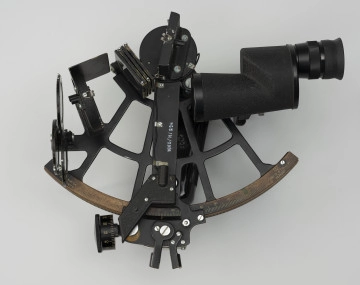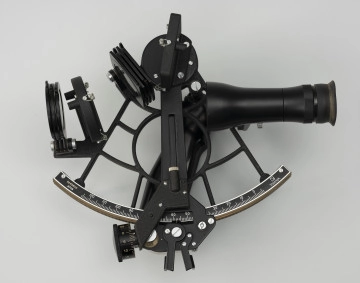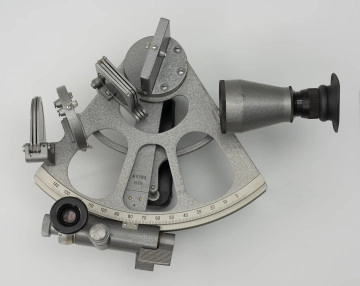
Tamaya sextant
1960 — 1970
National Museum in Szczecin
Part of the collection: Navigation history
A compass is a navigational instrument that determines the magnetic meridian's orientation. It was invented in China in the 11th century and arrived in Europe at the end of the 12th century. A compass is an essential tool to determine a location and direction of travel. The compass's working principle is based on setting a freely suspended magnet along a magnetic field. When it comes to the compass, we are faced with a magnetic needle set on an axis inside a casing, a capsule with an angular scale, i.e., the so-called wind rose. We divide compasses into wet and dry-card. In wet ones, such as the featured example, the compass capsule filled with liquid, while in dry ones it is empty. Prior to the introduction of gyroscopic compasses, invented at the turn of the 20th century, there were two compasses on a ship: the main compass set on the uppermost superstructure of the navigation platform and the rudder compass right next to the steersman's wheel. Leszek Kocela
Author / creator
Object type
compass
Technique
batch production
Material
wood, metal, colourless glass
Origin / acquisition method
acquisition
Creation time / dating
Owner
Muzeum Narodowe Szczecin
Identification number
Location / status

Tamaya Technics Inc., Shinagawa (1675- )
1960 — 1970
National Museum in Szczecin

Tamaya Technics Inc., Shinagawa (1675- )
1983-02-28
National Museum in Szczecin

unknown
circa 1976
National Museum in Szczecin
DISCOVER this TOPIC
National Museum in Lublin
DISCOVER this PATH
Educational path
0/500

We use cookies to make it easier for you to use our website and for statistical purposes. You can manage cookies by changing the settings of your web browser. More information in the Privacy Policy.
We use cookies to make it easier for you to use our website and for statistical purposes. You can manage cookies by changing the settings of your web browser. More information in the Privacy Policy.
Manage cookies:
This type of cookies is necessary for the website to function. You can change your browser settings to block them, but then the website will not work properly.
WYMAGANE
They are used to measure user engagement and generate statistics about the website to better understand how it is used. If you block this type of cookies, we will not be able to collect information about the use of the website and we will not be able to monitor its performance.